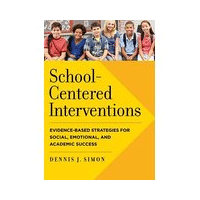“School-Centered Interventions: Evidence-Based Strategies for Social, Emotional, and Academic Success”

“School-Centered Interventions: Evidence-Based Strategies for Social, Emotional, and Academic Success”
By Dennis J. Simon
American Psychological Association
Washington, D.C., 2016
Decision making advice helpful to professionals
Reviewed by James K. Luiselli, Ed.D., ABPP, BCBA-D
The premise for this book is that “school-centered therapy is the most effective format for addressing social, emotional and behavioral issues for children and youth.” Unfortunately, many schools struggle with integrating academic demands and supportive mental health services. In addition, the most effective therapeutic practices are not always implemented with elementary, middle and high school students.
Dennis J. Simon is a clinical and school psychologist concerned about the proper translation of evidence-based interventions (EBIs) to schools. His book broadly describes various approaches which bridge the gap between efficacy research findings and practical application by school psychologists, social workers, counselors and community mental health professionals.
Simon emphasizes that evidence-based strategies must emerge from controlled research that clearly specifies characteristics of student populations, operationally defines intervention procedures and reports multiple outcome measures. To that end, his book concentrates on therapeutic methods that have been shown to be optimally effective with several psychological disorders.
Beginning chapters in the book describe the foundations of mental health services in schools. This framework is followed by separate chapters dealing with six diagnostic categories: ADHD, disruptive behavior disorders, pediatric bipolar disorder, depression, anxiety and related disorders and autism spectrum disorder. It appears that these conditions were selected based on their prevalence in schools and the strength of evidence support.
I liked many of the conceptual and procedural considerations Simon stresses in the book.
First, assessment should inform therapeutic intervention. School personnel can also benefit from treatment manuals, especially with students who resist intervention efforts and have complex clinical profiles. He further emphasizes a multi-tiered model of service delivery.
Another focal point of the book is several factors that apply to case formulation with school children and youth, namely developmental features, academic skills, educational accommodations, crisis protocols and family involvement. These and other domains are fully appraised for each diagnostic category.
Simon has written a very convincing book and essential guide to evidence-based practices in school. He gives readers a thorough description and analysis of therapeutic approaches that are likely to work best with students. His opinions are fully informed by high quality research and empirical documentation.
Knowing how and being able to implement what is covered in this book is and will be a daunting task for many resource-depleted schools. Nonetheless, reading Simon’s book allows school personnel and mental health professionals to make important decisions about the direction of therapeutic support for helping students achieve social, emotional and academic success.
I recommend this book to school practitioners from varied disciplines. It will also serve as an indispensable resource for professionals engaged in consultation to educational settings. As a college and university text, the book will fit nicely with courses devoted to clinical and school psychology, counseling, social work and special education.
James K. Luiselli, Ed.D., ABPP, BCBA-D, is Chief Clinical Officer, Clinical Solutions, Inc. and North East Educational and Developmental Support Center, Tewksbury, Mass..
Learn more about the book: School-Centered Interventions: Evidence-Based Strategies for Social, Emotional, and Academic Success (School Psychology)
